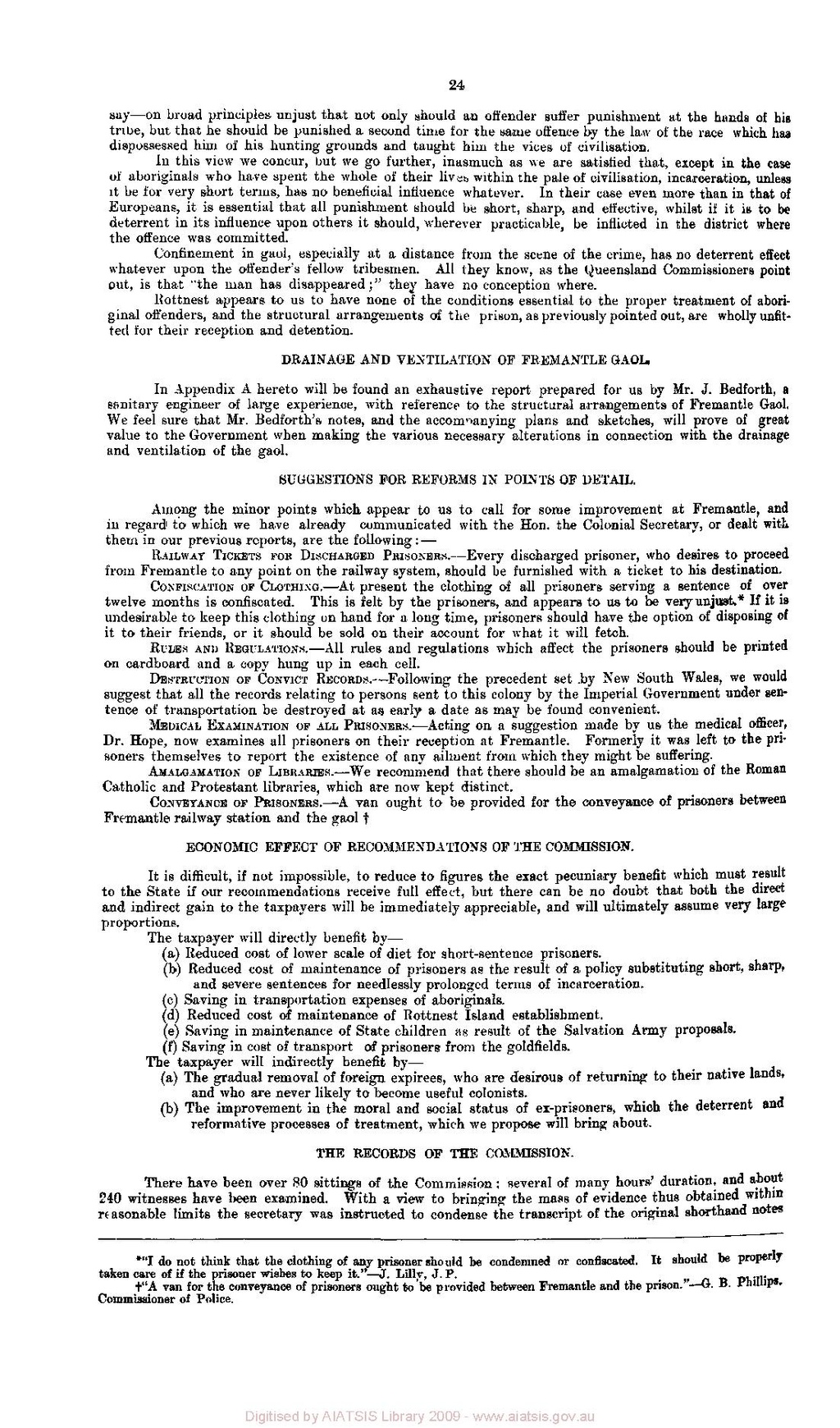24
say—on broad principles unjust that not only should an offender suffer punishment at the hands of his tribe, but that he should be punished a second time for the same offence by the law of the race which has dispossessed him of his hunting grounds and taught him the vices of civilisation.
In this view we concur, but we go further, inasmuch as we are satisfied that, except in the case of aboriginals who have spent the whole of their lives within the pale of civilisation, incarceration, unless it be for very short terms, has no beneficial influence whatever. In their case even more than in that of Europeans, it is essential that all punishment should be short, sharp, and effective, whilst if it is to be deterrent in its influence upon others it should, wherever practicable, be inflicted in the district where the offence was committed.
Confinement in gaol, especially at a distance from the scene of the crime, has no deterrent effect whatever upon the offender's fellow tribesmen. All they know, as the Queensland Commissioners point out, is that "the man has disappeared;" they have no conception where.
Rottnest appears to us to have none of the conditions essential to the proper treatment of aboriginal offenders, and the structural arrangements of the prison, as previously pointed out, are wholly unfitted for their reception and detention.
DRAINAGE AND VENTILATION OF FREMANTLE GAOL.
In Appendix A hereto will be found an exhaustive report prepared for us by Mr. J. Bedforth, a sanitary engineer of large experience, with reference to the structural arrangements of Fremantle Gaol. We feel sure that Mr. Bedforth's notes, and the accompanying plans and sketches, will prove of great value to the Government when making the various necessary alterations in connection with the drainage and ventilation of the gaol.
SUGGESTIONS FOR REFORMS IN POINTS OF DETAIL.
Among the minor points which appear to us to call for some improvement at Fremantle, and in regard to which we have already communicated with the Hon. the Colonial Secretary, or dealt with them in our previous reports, are the following:—
Railway Tickets for Discharged Prisoners.—Every discharged prisoner, who desires to proceed from Fremantle to any point on the railway system, should be furnished with a ticket to his destination.
Confiscation of Clothing.—At present the clothing of all prisoners serving a sentence of over twelve months is confiscated. This is felt by the prisoners, and appears to us to be very unjust.∗ If it is undesirable to keep this clothing on hand for a long time, prisoners should have the option of disposing of it to their friends, or it should be sold on their account for what it will fetch.
Rules and Regulations.—All rules and regulations which affect the prisoners should be printed on cardboard and a copy hung up in each cell.
Destruction of Convict Records.—Following the precedent set by New South Wales, we would suggest that all the records relating to persons sent to this colony by the Imperial Government under sentence of transportation be destroyed at as early a date as may be found convenient.
Medical Examination of all Prisoners.—Acting on a suggestion made by us the medical officer, Dr. Hope, now examines all prisoners on their reception at Fremantle. Formerly it was left to the prisoners themselves to report the existence of any ailment from which they might be suffering.
Amalgamation of Libraries.—We recommend that there should be an amalgamation of the Roman Catholic and Protestant libraries, which are now kept distinct.
Conveyance of Prisoners.—A van ought to be provided for the conveyance of prisoners between Fremantle railway station and the gaol.†
ECONOMIC EFFECT OF RECOMMENDATIONS OF THE COMMISSION.
It is difficult, if not impossible, to reduce to figures the exact pecuniary benefit which must result to the State if our recommendations receive full effect, but there can be no doubt that both the direct and indirect gain to the taxpayers will be immediately appreciable, and will ultimately assume very large proportions.
The taxpayer will directly benefit by—
- (a) Reduced cost of lower scale of diet for short-sentence prisoners.
- (b) Reduced cost of maintenance of prisoners as the result of a policy substituting short, sharp, and severe sentences for needlessly prolonged terms of incarceration.
- (c) Saving in transportation expenses of aboriginals.
- (d) Reduced cost of maintenance of Rottnest Island establishment.
- (e) Saving in maintenance of State children as result of the Salvation Army proposals.
- (f) Saving in cost of transport of prisoners from the goldfields.
The taxpayer will indirectly benefit by—
- (a) The gradual removal of foreign expirees, who are desirous of returning to their native lands, and who are never likely to become useful colonists.
- (b) The improvement in the moral and social status of ex-prisoners, which the deterrent and reformative processes of treatment, which we propose will bring about.
THE RECORDS OF THE COMMISSION.
There have been over 80 sittings of the Commission; several of many hours' duration, and about 240 witnesses have been examined. With a view to bringing the mass of evidence thus obtained within reasonable limits the secretary was instructed to condense the transcript of the original shorthand notes
∗10 "I do not think that the clothing of any prisoner should be condemned or confiscated. It should be properly taken care of if the prisoner wishes to keep it."—J. Lilly, J. P.
†8 "A van for the conveyance of prisoners ought to be provided between Fremantle and the prison."—G. B. Phillips, Commissioner of Police.
